September 17, 2021 -
No. 84
Workers
Must Control Economic Policy and Economic Outcomes
Canadian
Workers' Pension Monies Used to Privatize Water in Brazil
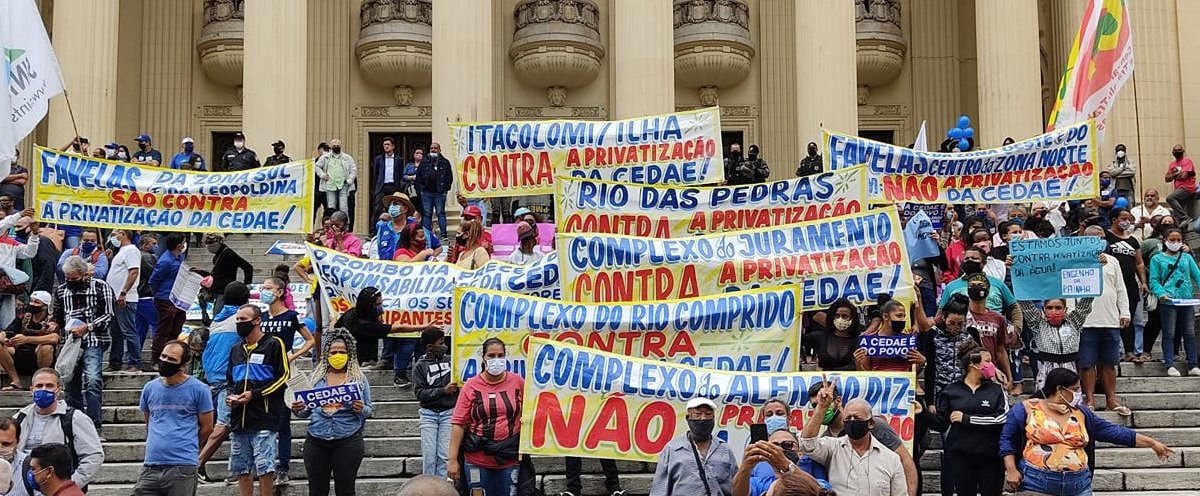
Protest in Brazil, May 3,
2021, against privatization of water and sewage services.
•
Greenwashing Privatization of
Public Utilities •
"Financialization" of Government
Pension Programs
BC
Government's Sell-Off of Public Lands to Powerful Private Interests
• Corruption to
Profit Privileged Buyers
- K.C. Adams
Workers
Must Control Economic Policy and Economic Outcomes
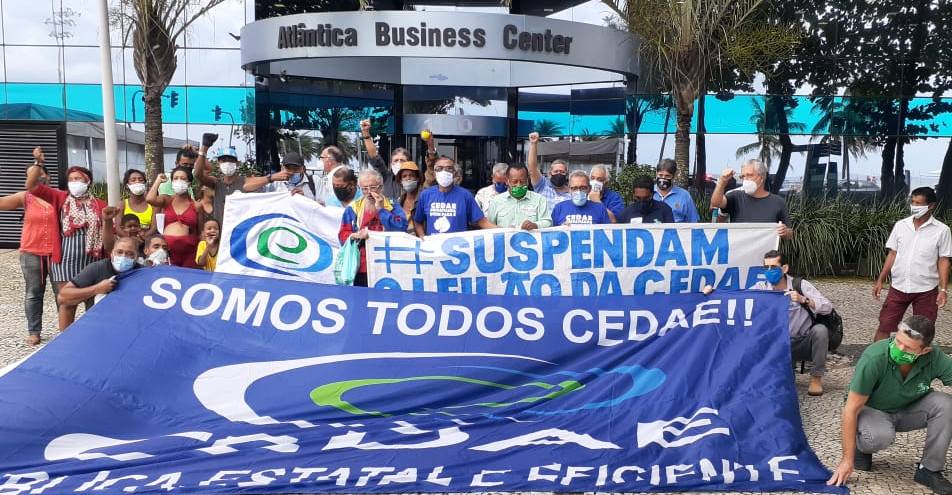 São Paulo,
Brazil, June 11, 2021. São Paulo,
Brazil, June 11, 2021.
One of the matters of ever greater concern
amongst Canadian workers is their lack of control over where their
pension monies are invested. These very large pools of money are put
into the hands of investment companies, financial institutions and
financial oligarchs whose job is to seek the highest return for
themselves
and sometimes but not always the safest bet, irrespective of where the
funds are invested. The workers exercise no control over the fact that
investments are done according to neo-liberal considerations and go
against everything Canadian workers on the whole stand for. The current
term for it is "financialization." It refers to a process whereby
financial markets, financial institutions and financial elites gain
greater influence over economic policy and economic outcomes. The
process transforms the functioning of economic systems at both the
macro and micro levels both at home and abroad in favour of these
narrow
private interests no matter what harm they cause to the social and
natural
environment. Under the guise that business is business, very harmful,
unacceptable nation-wrecking and anti-people investments are made.  Such
is the case with the investment made on April 30 of this year of more
than $900 million of Canadian workers' pension money to privatize water
and sanitation services in Brazil. A large section of Rio de Janeiro's
State Water and Sewage Company (CEDAE) was purchased at auction by a
private company 85 per cent owned by the Canada Pension Plan Investment
Board (CPPIB) and the Alberta Investment Management Corporation (AIMCo). Such
is the case with the investment made on April 30 of this year of more
than $900 million of Canadian workers' pension money to privatize water
and sanitation services in Brazil. A large section of Rio de Janeiro's
State Water and Sewage Company (CEDAE) was purchased at auction by a
private company 85 per cent owned by the Canada Pension Plan Investment
Board (CPPIB) and the Alberta Investment Management Corporation (AIMCo).
CEDAE was the most profitable water system in Brazil, bringing
in
$226 million a year, with part of these revenues used to subsidize
services in areas where costs were higher. AIMCo,
which says it manages the investments for 32 pensions,
endowments and government funds in the Province of Alberta, already
possessed a significant stake in Brazil's third largest private water
and sewage company, Iguá Saneamento, used to acquire part of
the public
utility. However it was a last minute infusion of some $270 million
from CPP Investments, giving it 46.7 per cent ownership of
Iguá, that
was decisive in allowing the company to win the bid for CEDAE.
In preparation for the auction CEDAE was divided into blocks
or
concessions. The most lucrative concessions were scooped up by private
interests, one of these being Iguá. The least profitable
ones remained
in the hands of the state, likely ending its ability to continue using
the profits from some to subsidize others. It will likely also push
rates
up for users already in the grips of a severe economic crisis.
Residents living in areas of Rio already serviced by private companies
are said to pay up to 70 per cent more for water than those serviced by
the public system. 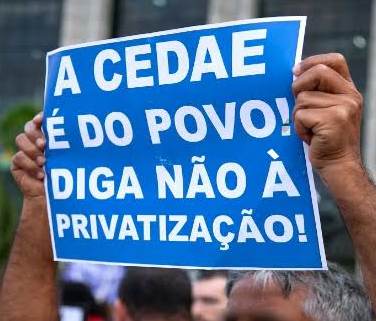 Opposition
by unions and others in Brazil as well as Canada to the privatization
of water and sanitation systems was swift. Brazilian unions said 3,500
public sector workers stood to lose their jobs. The Brazilian National
Urban Workers Union applied for and won an injunction to delay the
auction. State legislators also voted out of concern
for it to be delayed. Both of them were overruled by a government
decree that ordered the auction to go ahead as scheduled. Opposition
by unions and others in Brazil as well as Canada to the privatization
of water and sanitation systems was swift. Brazilian unions said 3,500
public sector workers stood to lose their jobs. The Brazilian National
Urban Workers Union applied for and won an injunction to delay the
auction. State legislators also voted out of concern
for it to be delayed. Both of them were overruled by a government
decree that ordered the auction to go ahead as scheduled.
The
auction took place in the midst of the terrible crisis Brazil was
going through thanks to President Jair Bolsonaro's reckless response
to the pandemic and the grim consequences of this for Brazilians. It
turns out the timing was likely deliberate. Bolsonaro's former
environment minister was secretly recorded urging colleagues at a
cabinet
meeting to take advantage of the pandemic and of people having other
preoccupations to get as many unpopular policies passed as they could,
as quickly as they could. Canadian Union of Public
Employees President Mark Hancock accused
CPP Investments of helping to legitimate Bolsonaro's privatization
agenda, saying "It's outrageous that our public pension plan is using
workers' retirement funds to profit from people's need for clean water
and safe sewage treatment. These are human rights that are
essential for survival. Access to water services is already fragile and
unequal in Brazil. Privatization will make things worse." The
handing over of Canadian workers' retirement funds without their
consent, and over their objection, to pay the rich through schemes
geared to assisting private interests at home and abroad to line their
pockets is unacceptable. It is all the more repugnant when it is
defended in the name of high ideals to detract from the anti-social and
nation-wrecking consequence of the investments. The
facts reveal that workers must control economic policy and
economic outcomes. They must set the direction of the economy and end
the policies which pay the rich and destroy the social and natural
environment. 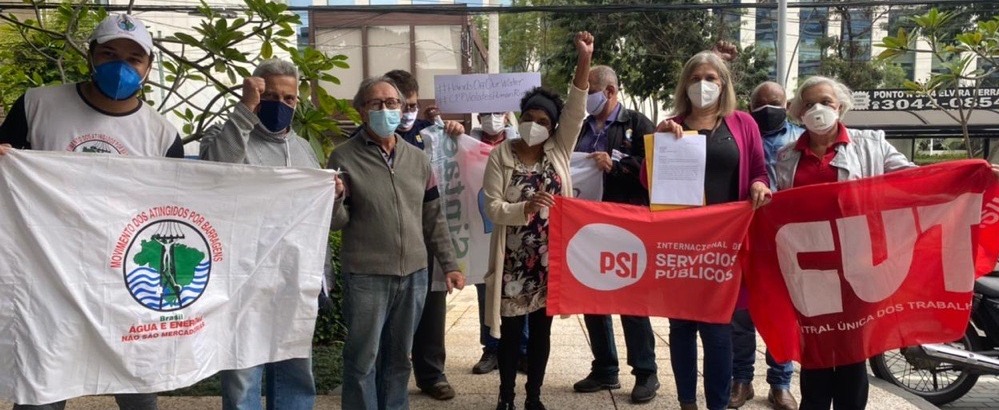
Protest at Canadian
consulate in Rio de Janeiro, June 2021.

Greenwashing the privatization
of public utilities has become the
fashion when it comes to self-serving and unethical pay-the-rich
schemes by governments and their agencies, including government-run
financial institutions and investment companies. A good example is the
Canada Pension Plan Investment Board's (CPPIB) greenwashing of its
privatization of Rio de Janeiro's public water system, presented as
supporting "sustainable projects and clean tech solutions in Brazil." The
Senior Vice President of Infrastructure & Renewable Resources
of
the Alberta Investment Management Corporation (AIMCo), which
collaborated with the CPPIB in the privatization, said the investment
management company was "excited" with the outcome of the auction and
"for the opportunity to invest further in the business alongside
like-minded partners to increase the service levels in water
distribution and sanitation in the State of Rio de Janeiro." He called
the acquisition, via its holdings in the private water and sewage
company Iguá Saneamento, "an excellent addition to our
infrastructure portfolio that is well-aligned to meeting our clients'
investment objectives." Does anyone believe that
Alberta public
sector workers, presumably the clients being referred to, would have as
an investment objective for their pension fund the privatization of
public services in Brazil or anywhere else? The
Latin America director of the CPPIB, who enthused in a press
release about the "new legal framework" established to facilitate the
auctioning off of Rio's public water system, was similarly excited
about the acquisition which he said would be followed by many more.
According to him, the private sanitation sector with its captive market
offers the prospect of a consistent and stable payback, and is
"perfectly compatible with our expectations, as long-term investors."
He added that Iguá was well positioned to be a powerful
competitor in most or all future auctions as nearly a thousand
Brazilian municipalities were expected to privatize, or seek
concessionaires, in the next few years. Scooping up
public utilities as fast as neo-liberal governments in
Brazil, Canada and elsewhere put them up for sale is but one of many
anti-social projects Canadian workers' pension funds have been used to
finance. Investment managers of the funds do their "fiduciary duty" of
investing workers' money where prospects of amassing maximum
capitalist profit are highest no matter the consequences. Everything
can be justified in the name of high ideals and this must change.
It is high time that working people themselves decide where
their
pension funds should be invested. The direction of the economy should
be set by working people, not financial markets, financial institutions
and financial elites. Pension funds come from the social wealth that
workers produce but do not control. It is this lack of control by the
workers, who are the producers, over what is produced and how it is
produced that is at the heart of the problem. The
social wealth produced by workers must be reinvested in a
socially responsible manner to build a diverse economy at home that has
an internal self-reliant strength and trades with others for mutual
benefit and development. Such an economy must have the aim to guarantee
the rights and well-being of all, and humanize the social and
natural environment. 
In the 1990s the international financial oligarchy and their
institutions pushed governments to restructure their pension systems so
the funds could be invested in financial markets where it was said
higher returns could be obtained than was possible by parking the money
in low-risk but more secure instruments like government bonds. Along
with this push to "financialize" pensions came the pressure to convert
pensions from defined benefit plans that guarantee a certain level of
benefits to workers after they retire, to defined contribution plans,
where the level of benefits one receives upon retirement depends on how
well the plan is doing in the financial markets and on returns from
other types of investments at any given time. A
big reason
for these changes, in addition to reducing governments' responsibility
to provide for workers' retirement security, was to put at the disposal
of the financial oligarchy a vast new pool of money to invest in order
to amass even greater private wealth for themselves. In
1997 the Canada Pension Plan Investment Board was created by
federal
legislation to operate at arm's length from the government. The mandate
of the new entity established as a vehicle for the financialization of
the CPP was to exercise its "fiduciary duty" to Canadians by first and
foremost maximizing the return on investments made on their
behalf. The Alberta Investment Management Corporation, established in
2008, operates in a similar way and under a similar mandate. 
BC
Government's Sell-Off of Public Lands to Powerful Private Interests
- K.C. Adams -
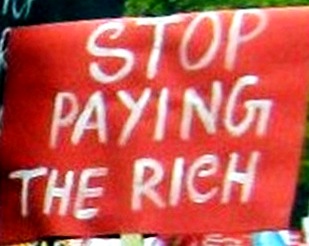 
Below
is Part Two of the series on BC Governments Sell-Off of Public Lands to
Powerful Public Interests. Part One appeared in Workers' Forum
September 15.
The private buyers of BC public property in many cases soon made
outsized profits. The following are examples of this profiteering from
the legalized corruption of the BC government to pay the rich.
Burke Mountain In a 2018 report, the BC
Auditor General Carol Bellringer noted that
the Liberal government sold off 150 hectares of public properties
in Coquitlam's Burke Mountain area for $85 million to a single buyer.
This was $43 million less than the known appraised market value.
In reviewing Bellinger's report, Vaughn Palmer writes in the Vancouver Sun,
"The Liberals must have known they were unloading the 14 parcels for
$43 million less than they were worth. When they signed off on the sale
in February 2014, they had in hand the appraiser's report putting the
value at $128 million. 'The appraisal was timely in
relation to the sale of the land,' says Bellringer. 'The quality of the
appraisal work was appropriate, and the appraised values for the
parcels of land were reasonable.'" Palmer
continues, "Knowing the shortfall, why didn't the Liberals
cancel the sale and do a proper one? I'm guessing it was because the
transaction, like other land sales at the time, was part of a rush-job
effort by the government of then-premier Christy Clark to try to
balance the budget. "The prime beneficiary of the
expensive-for-taxpayers transaction
involving the Burke Mountain lands, acquiring all 14 properties for
two-thirds of the appraised value, was Vancouver-based Wesbild
Holdings. In blowing the whistle on the sale to the legislature in the
spring of 2015, the then NDP Opposition noted that the company's
billionaire founder and chair, Hassan Khosrowshali, was a major donor
to the BC Liberals." George Pearson Centre and
Dogwood Lodge These two public health care
facilities on Cambie Street in Vancouver
comprised 25 acres. A SkyTrain line, which opened in 2009, runs
north-south
under Cambie. Onni developers bought both parcels from the government
in 2015-16 with plans to build thousands of housing units and
commercial spaces. Onni bought Dogwood Lodge in
2015 for $85 million and immediately
subdivided the land into two lots and began seeking city construction
permits. By 2019, the same property, now cleared of buildings, was
appraised at $380 million. Onni bought Pearson
Centre in 2016 for $217 million and subdivided
it into four lots. Officially appraised after its subdivision, the
market value of the four lots increased to $462 million. Without
building anything, Onni turned the $302 million it paid to
the BC government for the public lands of the two health care centres
into a total assessed value of $842 million. This meant a possible
profit of $540 million merely for being privileged recipients of a
state-run pay-the-rich scheme. By building on the lots, the return for
the
Onni oligarchs in control will be even greater. According
to the Elections BC website, the Onni oligarchs gave the
BC Liberal Party $575,000 and the BC NDP $115,000 between 2005 and 2018.
Cottonwood Lands The NDP/Green Party
coalition government sold the Cottonwood Lands
in Maple Ridge, which comprised 11 public properties on 21 hectares (52
acres) for $20 million in September 2017. Developers Polygon and
Morningstar together bought the 11 parcels and subdivided them into 71
lots. The 2019 assessed value of just eight lots of the 71 exceeded the
original $20 million the government received for all 11 parcels.
Polygon also bought Steveston Secondary School in Richmond and
Coronation Park Elementary School in Coquitlam during the sell-off.
The Elections BC website says the Polygon oligarchs gave the
BC
Liberal Party $962,000 and the BC NDP $87,000 between 2005 and 2018.
Moody Centre SkyTrain Station Developer
Ryan Beedie partnered with others to buy four public
properties near the new Moody Centre SkyTrain Station in 2017 and 2018
for a total of $29 million. The BC Liberal government initiated the
sale, which was completed after the BC NDP/Green Party coalition
government took power in 2017. Soon after Beedie took possession
of the four properties the appraised market value ballooned to
$116 million. Elections BC says Beedie donated $668,000 to the BC
Liberal Party between 2005 and 2018. The Aquilini
Investment cartel, well-known for its ownership of the
Vancouver Canucks, during the same 2005-18 period gave $1.5 million to
the BC Liberal Party and $270,000 to the BC NDP. The Aquilini group
partnered with others in 2014 to purchase 40 acres of public property
in Burnaby for $58 million. The property is known as the
Willingdon Lands. Even though designated as "surplus," the government,
after selling the property which houses several mental health and drug
treatment centres, leased it back from the Aquilini group. The rental
fee has not been disclosed. By 2018 the appraised market value of the
property without any additional development has risen from
$58 million to $123 million. The Aquilini cartel has submitted a
"master plan" for development of the Willingdon Lands, which is now
before Burnaby City Council. Lisa Moore, a
principal with the BC auditor general's office told the Vancouver Sun
that her office was aware of all the donations to the Liberals and the
NDP and the involvement of the donors in purchasing public
property. She said the donations did not violate the election rules in
force at the time. The BC government changed the
rules governing donations to BC
political parties in November 2017, banning most donations from
companies and unions. The BC public treasury is now the largest source
of funds for the three cartel parties in the BC Legislature. The
government pays the cartel parties an annual allowance according to the
number of votes received in the election. In the two and a half years
prior to the 2020 BC election, the government paid out approximately
$16.5-million to the three cartel parties that have members in the
legislature. To
be continued — Part Three: "BC
Sold 50 Schools and Educational Land Lots in Six Years and Now Faces a
Shortage of K-12 Space"

(To
access articles individually click on the black headline.)
PDF
PREVIOUS
ISSUES | HOME
Website:
www.cpcml.ca
Email: office@cpcml.ca | 
